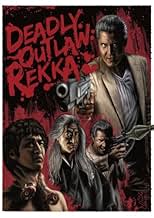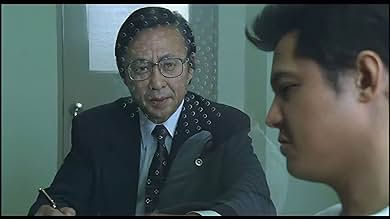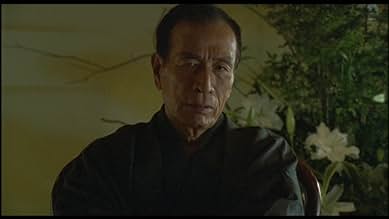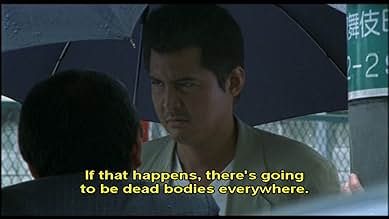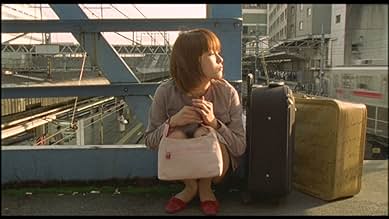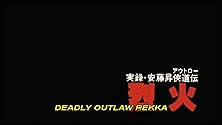Jitsuroku Andô Noboru kyôdô-den: Rekka
- 2002
- 1 घं 36 मि
IMDb रेटिंग
6.7/10
1.8 हज़ार
आपकी रेटिंग
अपनी भाषा में प्लॉट जोड़ेंWhen his beloved boss is killed, a dangerous young gangster cuts a path of vengeance through the Japanese mafia.When his beloved boss is killed, a dangerous young gangster cuts a path of vengeance through the Japanese mafia.When his beloved boss is killed, a dangerous young gangster cuts a path of vengeance through the Japanese mafia.
फ़ीचर्ड समीक्षाएं
Seemingly modeled after DEAD OR ALIVE, starting off with a stylistical hodge podge of slow-mo gunfights and paranoid posturing and sizzling in the finale with a fair share of comic-book outrageousness, Rekka succeeds as a movie not for being ultraviolent or particularly graphic (it is neither by Miike standards - although still violent enough to raise a public outcry if it was the work of a mainstream American director), not because yakuza underlings get shot full of holes or Riki Takeuchi scowls like a bulldog as he shoots rocket launchers in the middle of crowded streets (DOA homage anyone?), not for the sound and fury, but for the moments in between. In that respect, Rekka is antithetical to DOA. Whereas DOA dragged through a drab and lifeless middle act to arrive at an exciting conclusion, Rekka sustains itself through moments of quietude and intimacy. In between the outbursts of violence, Miike gives us life as lived. Takeuchi's friend giving him advice on his hair dye. The glances between Takeuchi and his Korean girlfriend. The dingy eateries, night clubs and neon-lit streets - Miike prowling Fukasaku's stampin' grounds half a century after the patriarch of the yakuza film first pictured a different kind of postwar Japan.
In the end, Rekka works so well as a movie because Miike restrains the child within him eager to shock and impress and embraces the dramatist who observes the small moments of life. The plot is mostly forgettable, something about the son of a yakuza boss going on a spree to avenge the death of his father while a gangland conspiracy festers behind and a war between the different fractions is about to break out, and Takeuchi in the leading role scowls a little too much for my liking. But overall, this is as good a yakuza flick as I've seen from Miike, violent, funny, occasionally beautiful, imaginatively conceived but hastily executed (as with most Miike films), a thoroughbred Miike flick bearing all his trademarks, one aimed at both the heart and the gut. Not a masterpiece of any kind but a worthwhile movie.
In the end, Rekka works so well as a movie because Miike restrains the child within him eager to shock and impress and embraces the dramatist who observes the small moments of life. The plot is mostly forgettable, something about the son of a yakuza boss going on a spree to avenge the death of his father while a gangland conspiracy festers behind and a war between the different fractions is about to break out, and Takeuchi in the leading role scowls a little too much for my liking. But overall, this is as good a yakuza flick as I've seen from Miike, violent, funny, occasionally beautiful, imaginatively conceived but hastily executed (as with most Miike films), a thoroughbred Miike flick bearing all his trademarks, one aimed at both the heart and the gut. Not a masterpiece of any kind but a worthwhile movie.
Assassins from the Otaki group murder Yuya Uchida (manager/producer of 1970's psychedelic prog metal band Flower Travellin' Band, who provide the film's soundtrack) leader of the Sanada group. Riki Takeuchi considered him a father figure and wants vengeance, but the leaders of both groups want to avoid a war and enlist Bando group leader Sonny Chiba to negotiate a truce.
So ... it's all a scheme by both groups second-in-commands to eliminate the leaders and take over, with Chiba running the whole show. They trick Takeuchi into killing Otaki group leader Renji Ishibashi and then try to kill him to close all loose ends. Those loose ends stay very much open.
Takashi Miike has a tendency to make films that are so loose and ramshackle that they feel like they may fall apart at any minute. This is one of those. That doesn't mean they're necessarily bad ... and this one certainly isn't ... but it does mean that after a really dynamic opening and before it's amazing gonzo conclusion, you get a lot of meandering scenes of yakuza dumping plot exposition on each other. It's not always dull ... mainly due to Miike's tendency to stage very weird scenes like two yakuza talking outdoors in a playground in the rain each holding tiny transparent plastic umbrellas ... but it frequently is.
The Flower Travellin' Band soundtrack is worth the price of admission.
So ... it's all a scheme by both groups second-in-commands to eliminate the leaders and take over, with Chiba running the whole show. They trick Takeuchi into killing Otaki group leader Renji Ishibashi and then try to kill him to close all loose ends. Those loose ends stay very much open.
Takashi Miike has a tendency to make films that are so loose and ramshackle that they feel like they may fall apart at any minute. This is one of those. That doesn't mean they're necessarily bad ... and this one certainly isn't ... but it does mean that after a really dynamic opening and before it's amazing gonzo conclusion, you get a lot of meandering scenes of yakuza dumping plot exposition on each other. It's not always dull ... mainly due to Miike's tendency to stage very weird scenes like two yakuza talking outdoors in a playground in the rain each holding tiny transparent plastic umbrellas ... but it frequently is.
The Flower Travellin' Band soundtrack is worth the price of admission.
Miike makes another yakuza picture. It's not especially groundbreaking, and it's certainly not one of Miike's deeper films, but it is extremely entertaining. That's mostly because of the main character, Kunisada (Miike regular Riki Takeuchi), who is the most psychopathic character in Japanese movies since Tatsuya Nakadai's evil samurai in Sword of Doom. Kunisada's mob boss, his surrogate father, is ambushed and murdered (though not before nearly strangling his assailant to death; the hit-man only lives because he cuts the dead man's hands off as they clench around his windpipe). Simultaneously, Kunisada, almost as if through a psychic bond, breaks out of jail and starts to go against the rival gang. The only problem is that the boss's death isn't necessarily a bad thing from his own gang's perspective. They and their rival gang try desperately to make a truce. Unfortunately for everyone, except for a small handful of loyal comrades, Kunisada won't stop until everyone around him is dead. The film suffers from Miike's major flaw as a filmmaker: a lack of coherency. There seem to be dozens of named characters, and it becomes very difficult to sort out who everyone is. I had to watch key scenes a second time to piece it all together (though I had most of it straight by the end of the film). But, even if you never quite figure it out, Miike's patented break-neck action sequences are so outrageously done that the film is more than worth watching. Watch out when Kunisada finds a rocket launcher!
excerpt, more at my location - A yakuza film is bread and butter for Takashi Miike, and Deadly Outlaw: Rekka (Jitsuroku Andô Noboru kyôdô-den: Rekka), sandwiched between the sadistic violence of Ichi The Killer and the surrealism of Gozu, is surprisingly ordinary when compared with much of the director's oeuvre. However, the straightforward nature of this 2002 film is the essence of its charm.
Deadly Outlaw: Rekka is such unabashed fun it will leave you feeling indulgent and sporting a maniacal grin from start to finish, just like the one, you might imagine subsequent to viewing, Miike wore while making it. Concentrated to an hour-and-a-half, as so few recent films are, it hits you like a shot of pure audio-visual entertainment straight in the arm.
Deadly Outlaw: Rekka is such unabashed fun it will leave you feeling indulgent and sporting a maniacal grin from start to finish, just like the one, you might imagine subsequent to viewing, Miike wore while making it. Concentrated to an hour-and-a-half, as so few recent films are, it hits you like a shot of pure audio-visual entertainment straight in the arm.
DEADLY OUTLAW: REKKA is a rare misfire from the usually interesting Takashi Miike, who can typically be relied upon from making outrageously entertaining movies. This is a standard Yakuza movie, featuring a low rent thug who decides to go on an odyssey of revenge, yet despite a few moments of surrealism and violence you can't really tell it's a Miike film at all.
Instead it has more in common with low budget art-house fare, featuring interchangeable characters and some padded scenes of characters wandering the streets aimlessly at night. Oh, there's bound to be a brutal fight scene or execution around the next corner, but there isn't anything that makes you care about what's going on. Okay, I don't watch a Miike film for the characterisation, but at least ICHI THE KILLER had tons of incident and AUDITION's slow build worked when matched with THAT ending.
This one's predictable in the extreme, I couldn't care less about the characters, and the whole 'stone face' type of acting is just a bit dull. Miike tries to spice things up with a sex scene here and a mutilation there, but it isn't enough; for much of the running time, I was simply bored. DEADLY OUTLAW: REKKA does have the same kind of hustle and vibe as the early gangster films of Beat Takeshi, but it lacks their finesse and raw power. Attempts to make it feel like an old-fashioned grindhouse movie of the 1970s don't really gel either; instead this movie is both slight and forgettable.
Instead it has more in common with low budget art-house fare, featuring interchangeable characters and some padded scenes of characters wandering the streets aimlessly at night. Oh, there's bound to be a brutal fight scene or execution around the next corner, but there isn't anything that makes you care about what's going on. Okay, I don't watch a Miike film for the characterisation, but at least ICHI THE KILLER had tons of incident and AUDITION's slow build worked when matched with THAT ending.
This one's predictable in the extreme, I couldn't care less about the characters, and the whole 'stone face' type of acting is just a bit dull. Miike tries to spice things up with a sex scene here and a mutilation there, but it isn't enough; for much of the running time, I was simply bored. DEADLY OUTLAW: REKKA does have the same kind of hustle and vibe as the early gangster films of Beat Takeshi, but it lacks their finesse and raw power. Attempts to make it feel like an old-fashioned grindhouse movie of the 1970s don't really gel either; instead this movie is both slight and forgettable.
क्या आपको पता है
- ट्रिवियाTakashi Miike cut this movie to the strains of the 1971 progressive rock album "Satori" by the Flower Traveling Band, which he learned of through costars Joe Yamanaka and Yûya Uchida, who were also the band's founding members. Miike found the album to be way ahead of its time and was delighted at how well and inconspicuously it cut into a movie made 30 years later.
- गूफ़At 35:52 the shadow of someone holding a hand-held camera can be seen.
- कनेक्शनReferenced in Rewind This! (2013)
टॉप पसंद
रेटिंग देने के लिए साइन-इन करें और वैयक्तिकृत सुझावों के लिए वॉचलिस्ट करें
विवरण
- रिलीज़ की तारीख़
- कंट्री ऑफ़ ओरिजिन
- आधिकारिक साइट
- भाषा
- इस रूप में भी जाना जाता है
- Deadly Outlaw: Rekka
- उत्पादन कंपनी
- IMDbPro पर और कंपनी क्रेडिट देखें
- चलने की अवधि
- 1 घं 36 मि(96 min)
- रंग
इस पेज में योगदान दें
किसी बदलाव का सुझाव दें या अनुपलब्ध कॉन्टेंट जोड़ें

